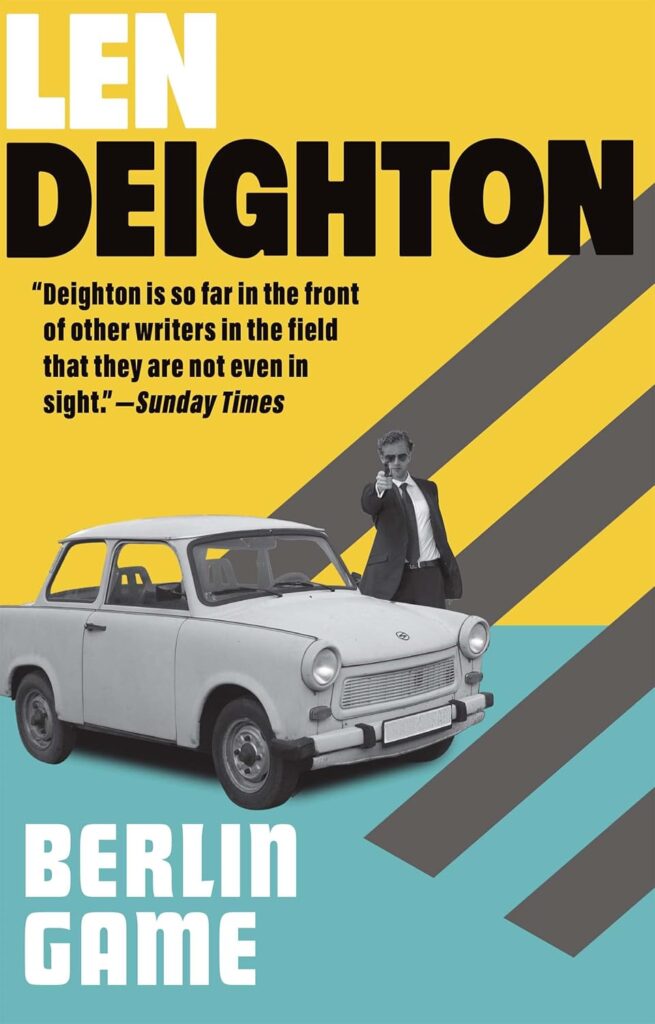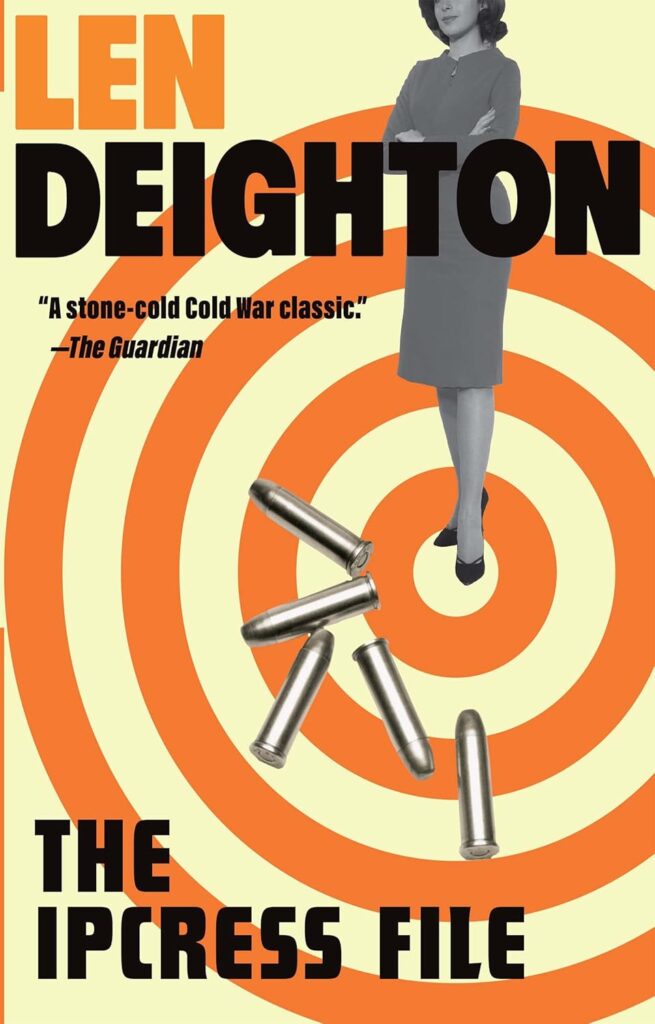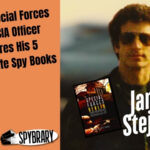
Len Deighton is a British thriller writer and spy novelist, this guide will help you decide where to start with Len Deighton.
So you have heard that Len Deighton's books are worth a read but you don't know where to start? We'd like to help you pick the right Len Deighton book with our Spybrary Firsts spy book recommendations.
Purchase Len Deighton Books and support Spybrary.
Len Deighton is one of the most influential authors in the espionage genre, renowned for his intricate plots, gritty realism, and keen eye for historical accuracy. With such an extensive body of work, knowing where to begin can be a challenge. This guide will help you navigate his books, starting with the best entry points for both newcomers and seasoned readers.
Where to start with Len Deighton – For New Readers: Start with Berlin Game
If you’re new to Len Deighton, the best place to start is with Berlin Game (1983). This book is the first in the Bernard Samson series, and it’s a perfect introduction to Deighton’s style and storytelling. Here’s why:
- Gripping Plot: Berlin Game follows British intelligence officer Bernard Samson as he navigates the dangerous world of Cold War espionage. The book is filled with suspense, political intrigue, and a deep sense of betrayal, hallmarks of Deighton’s work.
- Character Depth: Deighton’s protagonist, Bernard Samson, is a relatable, flawed character whose struggles with loyalty, trust, and personal conflict make him stand out in the genre.
- Cold War Atmosphere: The novel captures the tension and paranoia of Cold War Berlin, providing a vivid backdrop that sets the stage for the entire series.
- Kicks off one of the best spy book series in the espionage fiction genre. There are nine books in this series along with a prequel called Winter.
Where to start with Len Deighton – Why Berlin Game is a Great Starting Point
Berlin Game is an accessible entry into Deighton’s world. It doesn’t require any prior knowledge of his other works, and its blend of complex characters and a fast-paced plot will hook you right from the start. Plus, it's the beginning of a trilogy that’s followed by Mexico Set and London Match, allowing you to immerse yourself in a longer narrative arc if you enjoy the first book.
Did you know that Len Deighton, Berlin Game and Bernard Samson inspired Shane Whaley to set up the Spybrary Spy Podcast and spy community.
‘Back in 2017, I devoured every book in the Bernard Samson series and was left with this burning desire to talk about it with others who enjoyed the books. That craving for conversation, for digging into the twists and turns of Len Deighton's intricate plots, was the spark that ignited Spybrary. It’s why our very first episode dives headfirst into the world of Len Deighton—it was all about sharing that excitement, connecting with fellow readers, and creating a community where espionage fans could dissect and celebrate the works of masters like Deighton together.'
Shane Whaley – Founder of Spybrary.

For Advanced Readers: Explore The IPCRESS File
For those who are familiar with espionage fiction or are looking to dive deeper into Len Deighton’s unique style, The IPCRESS File (1962) is a must-read. This was Deighton’s debut novel, establishing him as a major force in the genre. Here’s why it’s perfect for advanced readers:
- Innovative Narrative: The book introduced an unnamed protagonist (later famously portrayed as Harry Palmer in the film adaptations), who is cynical, witty, and unlike the typical glamorous spy hero of the era.
- Complex Plotting: The story revolves around brainwashing, double agents, and bureaucratic rivalries within British intelligence. It’s a cerebral thriller that challenges readers to keep up with its twists and turns.
- Cultural Impact: The IPCRESS File redefined spy fiction by adding realism and a gritty, almost noir-like atmosphere to the genre, influencing later works and authors.
The Ipcress File: A Turning Point in Spy Books and Cinema
The success of The Ipcress File, both the book and the movie, marked a significant victory for Len Deighton and Michael Caine and for the portrayal of the working class. This film reshaped the British spy genre, breaking away from its traditional association with the upper echelons of society.
A new type of secret agent emerged—one who was far from flawless. With his signature tortoise-shell glasses, Cockney accent, and irreverent demeanor, Harry Palmer represented a grounded perspective. He navigated the world of espionage while confronting his deceitful (and often bumbling) superiors, offering a fresh and relatable take on the spy narrative.
Why Advanced Readers Will Love The IPCRESS File
The IPCRESS File is best suited for readers who appreciate a challenge and enjoy dissecting layered narratives. Its intricate plot and non-linear storytelling require close attention, making it a rewarding experience for those who thrive on complex, thought-provoking spy fiction.
Where to start with Len Deighton
Understanding the Bernard Samson Series
After starting with Berlin Game, you might want to continue through the rest of the Bernard Samson series. The series is divided into three trilogies:
- Game, Set, and Match Trilogy:
- Berlin Game (1983)
- Mexico Set (1984)
- London Match (1985)
- Hook, Line, and Sinker Trilogy:
- Spy Hook (1988)
- Spy Line (1989)
- Spy Sinker (1990)
- Faith, Hope, and Charity Trilogy:
- Faith (1994)
- Hope (1995)
- Charity (1996)
This extended series follows Bernard Samson through a web of political intrigue, shifting loyalties, and personal betrayals. It’s a deep dive into the world of espionage that rewards readers who enjoy long-form storytelling.
Standalone Novels to Consider
If you’re interested in exploring more of Deighton’s work beyond the series, here are a couple of standalone novels that showcase his range and versatility:
- Bomber (1970): A meticulously detailed account of an RAF bombing raid during World War II. This novel highlights Deighton’s talent for blending historical accuracy with gripping storytelling.
- SS-GB (1978): An alternative history novel where Nazi Germany has successfully invaded Britain. This thriller is a fascinating exploration of life under occupation and the moral dilemmas faced by those in power.
Themes and Styles in Deighton’s Work
Len Deighton’s novels often delve into themes of betrayal, loyalty, and the moral ambiguity of espionage. His characters are far from the typical heroic figures; they’re flawed, cynical, and often conflicted about their roles in the world of intelligence. Deighton’s writing style is sharp, witty, and filled with meticulous detail, offering a realistic portrayal of the espionage world.
Why You Should Read Len Deighton
Len Deighton’s influence on spy fiction is undeniable. His focus on realism, combined with his ability to create gripping, character-driven narratives, sets his work apart from other writers in the genre. Whether you’re a casual reader or a die-hard fan of espionage novels, Deighton’s books offer a rich and rewarding reading experience.
Len Deighton and the Creation of Harry Palmer/Unknown Spy
To fully appreciate the development of the spy genre in 1960s Cold War Britain, one must look at the life of Leonard Cyril Deighton, who was born in 1929 in Marylebone, central London.
Deighton's early encounter with espionage came through his mother, who worked as a cook. In 1940, she was employed by Anna Wolkoff, a fashion designer who turned out to be a Nazi spy. Wolkoff was arrested for passing messages between British Prime Minister Winston Churchill and U.S. President Franklin D. Roosevelt to the Germans. This dramatic event left a deep impression on the 11-year-old Deighton, which he later described as a pivotal moment in his decision to write spy fiction.
“I remember that night vividly,” Deighton once said. “It was early May 1940 when I heard the commotion outside. Leaning out of the window alongside my parents, we saw police cars in the street. Special Branch officers were at the door, and before long, they had taken her away to face charges of espionage.”
Deighton's father was a mechanic and chauffeur, and Deighton himself developed a keen interest in technology, which he later utilized during his national service in the Royal Air Force (RAF). During his time there, he photographed and engaged in mock combat exercises using cine cameras while flying Mosquito fighters.
After his RAF service, Deighton pursued studies at the Royal College of Art in London, followed by a stint in advertising and graphic design. He even designed book covers, including one for the UK edition of Jack Kerouac's On the Road, a defining text for the Beat Generation. Reflecting on that era, Deighton said, “London was gearing up for the Swinging Sixties, and every day felt like an adventure.”
Len Deighton: From Illustrator to Bestselling Author
Len Deighton’s career was a journey through diverse roles. He once served as an airline steward for BOAC. Later, he became a food columnist for The Observer, creating his signature ‘cook strips'—illustrated, step-by-step recipes that were eventually compiled into his 1965 Action Cook Book, the first of several cookbooks aimed at bachelors.
Deighton also worked as a travel editor for Playboy magazine, which led to stays at Hugh Hefner’s Playboy Mansion in Chicago and frequent globetrotting adventures. “One of my most memorable trips was to Hawaii, where I had my own helicopter to use like a private air taxi, jumping from one destination to another,” he once remarked.
Len Deighton: The Journey of a Spy Novelist
During his life, Len Deighton married twice and became the father of two sons, both of whom would go on to become pilots and skilled cooks. He began writing his debut novel, The Ipcress File, while on a holiday in France. His initial drafts were heavily influenced by Battle For The Mind by William Sargant, a book he revisited multiple times for its insights into the techniques used by brainwashers, evangelists, and psychiatrists.
A year later, Deighton returned to France and gradually completed his draft. Reflecting on his journey to publication, he said, “The manuscript might still be gathering dust if I hadn’t met Jonathan Clowes, a literary agent, at a party. What started as a few disjointed notes—perhaps for an amateur film idea—eventually evolved into a short story and, after numerous revisions, became a fully-fledged novel.”
The Reluctant Spy Author
Despite his achievements as a writer, Len Deighton often felt unfulfilled in his literary career. “At one point, all I wanted was to be an illustrator,” he shared with the Deighton Dossier fan site. “There’s a camaraderie among photographers, illustrators, and art directors—a world of friendly, creative peers. Writing, on the other hand, is much more competitive.”
Although Harry Palmer, one of his most iconic characters, was seen as a working-class spy, Deighton never considered himself a ‘class warrior.’
“I’ve always respected skills and education,” he noted. “Britain’s public schools instill values like loyalty, modesty, justice, and sacrifice—qualities I greatly admire. When I mock authority, it’s not about class, but rather a response to the incompetence that often comes with cronyism. Prejudice, in any form, is destructive and illogical.”
Despite his ambivalence toward writing, Deighton authored 23 books, including Où est le garlic, a French cookbook, and the nine-part Bernard Samson series, featuring a tough and cynical MI6 officer. His bibliography also includes several military history books and numerous other titles that cemented his place in the literary world.
Conclusion
Starting with Berlin Game is the perfect way to enter the books of Len Deighton, offering a blend of suspense, character depth, and Cold War intrigue. For those ready to tackle a more complex narrative, The IPCRESS File provides a challenging and iconic journey into the world of espionage. Wherever you begin, Len Deighton’s novels are sure to captivate anyone interested in the shadowy world of spies and intelligence.
More Len Deighton Books Resources
- Len Deighton Books
- The Deighton Dossier
- All About Len Deighton – the first ever episode of Spybrary with The Deighton Dossier's Rob Mallows.
- Len Deighton: Britain's most underrated writer? He is 95 and living contently in retirement but his contribution to Anglophone literature and film is enormous and under-recognised by many.
- The Next Best Thing To A Len Deighton Biography.









